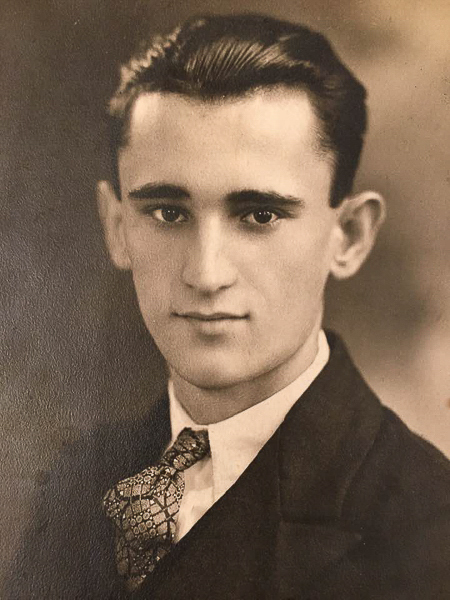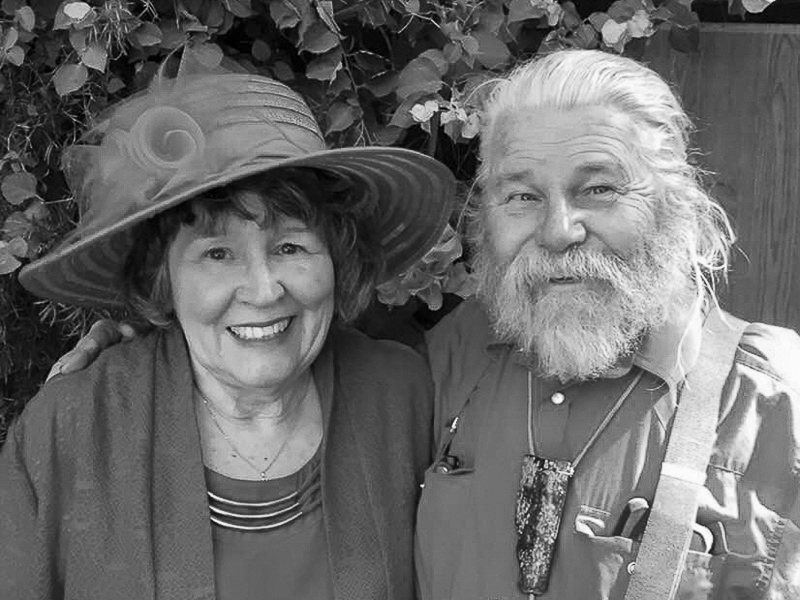
John Evanich
Evanich Family History
Family History Written by Louise Evanich Jandacek
Although I’ve researched some genealogy of the family further back than my grandparents, I’ve decided to start with their lives, leading up to my story.
Grandpa’s Story
My paternal grandfather was John Evanich (Janez Ivanic’), born in Belcji Vrh, Bela Krajina, Slovenia on August 31, 1899. His parents were Jakob Ivanic’ and Mary Gas’peric’.
At the time Slovenia was part of the Austrian Hungarian Empire. The people in this area of Slovenia spoke the juz’nobelokranjsko narec’je dialect. I believe John was the only boy in the family but he did have several sisters. When his father died John was raised in a family of girls and was a bit spoiled. John attended school through the 6th grade, which was rather common for that time and place. Belcji Vrh is in the south-eastern part of Slovenia, most people were farmers, miners or craftsmen. John wasn’t very tall, perhaps 5’3”. He was quite strong with large wrists. As the years went on he gained a sizable girth too. He was a jack of all trades, having skills in all sorts of construction work.
He was a teenager when WWI broke out and was drafted into the Austrian army. He served as a machine gunner in the trenches in Romania. The story goes that he had to be so familiar with the parts of the machine gun that he had to disassemble and reassemble it while being blindfolded. Apparently he did this quite well. I believe he fought in the trenches in Romania and the machine gun was moved from place to place on the back of a mule. John had a quick temper upon occasion and once when the mule wasn’t cooperating he kicked it. An officer witnessed this and chewed John out, professing the value of the mule to be higher than that of the soldiers.
When the war ended John had to walk back home. Along the way he stopped to work on a farm for room and board. The farmer had a daughter who perhaps saw her future with John and over several weeks she sewed him a long heavy coat. One night the farmer discovered John with his daughter. In a rush John jumped out of the window, taking his new coat with him, and fled.
At some point when he was a young man John went across the Kolpa River into Croatia to work construction on a brewery in Karlovac. Part of the pay was in beer. John, years later, told us that other workers were afraid to walk on the beams two stories above the ground but his balance was good and he bragged that he walked like a gymnast on a tight rope.
Back in Belcji Vrh the young people from neighboring villages got together on Sunday evenings to sing and dance. There John met Josephine Jurs’inic’ from the village of Hrast and they fell in love. Josephine, according to John, was the most beautiful girl in the village.
They were married in 1919. My father, John Michael Evanich (Janez Ivanic) was born in 1920 and then baptized in the village of Dragatus’ Slovenia. The church he was baptized in was shelled and demolished during the WWII.
Following WWI, Slovenia was removed from the Austrian Hungarian Empire and added to Croatia, Serbia, etc. to form the new country of Yugoslavia. The new country needed its own standing army and there were rumors that young men, like John, would soon be drafted. Not wanting to be in the army yet again, John paid off an official with a bribe to acquire an exit visa, papers necessary to leave Slovenia and immigrate to America. He landed on Ellis Island USA in 1921. This is where his name was changed from Janez Ivanic to John Evanich.
Josephine, nickname Pepa, insisted that John send her the passage money so that she and baby Janez could also come to America. After getting settled and finding a job, he did send the passage money.
At first John sought work in the copper mines of Minnesota. He didn’t like being in the mines, so he moved to Whiting , Indiana where his friends Mr. Kobe and his wife, Elizabeth, lived. Elizabeth was Josephine’s sister. At first John went to work at Standard Oil of Indiana. One day he had an argument with his boss and started to swear at his boss in German. The boss understood the German and John was fired on the spot.
His next employment was at a company making oil tank cars, called UTLX. I believe he did welding and painting. During the depression years of the 1930s, he worked whenever possible, sometimes unemployed, and eventually went to work for the WPA on public works projects.
After finalizing his American citizenship John was proud of his new status. He put up a flag pole and flew the American flag daily. He also informed the family that from now on they were to speak English.
The family grew to six children, John, Anne, Mary, Angeline, Josephine, and Bernard. They took in borders to add additional income. The address was 2444 Schrage Avenue, Whiting, Indiana. John had a still and made wine. Occasionally these brought in extra money. Times were hard and they managed the best they could.
When the children went out to work, all the money was turned into John for the family. His temper got the best of him sometimes. My father remembers a punishment being kneeling on a pile of clinkers (the sharp residue from the coal furnace) until his knees were bleeding. Beatings were common also.
Following the war, John built another house on the back of the lot. His son, John, my father, moved his family into that new house in 1947. There was a swing in the back yard, a nice place to enjoy the cool summer evenings. John also had hunting dogs, the last one I remember was Duda.
There was a Slovenian community in Lamont, Illinois, centered around a monastery. Yearly picnics were held there, including roasting a lamb on an open spit.
John and Pepa also made homemade blood sausage, krvava klobasa. John used only the best ingredients, pork roasts, rice, marjoram, etc. This was the all time best sausage I’ve ever eaten in my life. It was a family project with everyone helping out, stuffed sausage casings hanging on broom handles from the basement ceiling. John certainly enjoyed Na Zdravje (To Health), the toast with a shot and a beer.
John eventually bought a boat, named it Pepa. He’d take it out on Lake Michigan for fishing. The boat was parked in the two car garage under the back house. As the next generations of cousins got old enough John would take them out on the boat for rides in the summer.
One year as John was approaching retirement he and Pepa took a vacation to visit a distant cousin, Mr. Shute in New Port Richey, Florida. They fell in love with the area and soon bought a house and moved from northern Indiana down to the Gulf Coast of Florida.
It was a corner lot, and on that corner John built a grotto to the Blessed Virgin Mary, and erected another flagpole for the American flag. In the back yard were citrus trees and a shuffleboard court. It was a beautiful retirement place, warm and with flowers and palm trees. In Florida Na Zdravje commenced at 9:30 a.m. Another swing was built too.
In the 1960s with the civil rights unrest in the south when John was driving north and south he’d carry a loaded shotgun across his lap. No trouble ever occurred but he was certainly prepared.
John loved deep sea fishing in the Gulf of Mexico and went as often as he could. He and Pepa also enjoyed playing hearts, and entertaining the family frequently. He generously gave away grapefruits and oranges too.
John and Josephine made one trip back to Slovenia. Anne, their daughter, went with them. At first when people suggested a trip back John was apprehensive that he’s be drafted into the army. Finally, in his 70s, they went and had a wonderful vacation back to the old country. They returned with souvenirs for everyone. For himself John kept the Slovenian polka records. As his hearing was fading by then, the entire block could enjoy the music!
As old age required more and more care, their daughter Josie took John and Pepa to Mobile, Alabama to live with her family. Josephine died first and then John followed, passing away in 1987.
His remains were buried in New Port Richey, FL at the cemetery off of Trouble Creek Rd.
Wedding 1966
At our wedding reception my sister took off my veil and tied an apron around my waist. Those were the days when women belonged in the kitchen. It seemed perfectly natural at the time.
(505) 672-9562
Petr Jandacek
Louise Jandacek
Mailing Address
127 La Senda Road
Los Alamos, New Mexico
USA
87544


